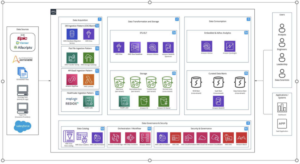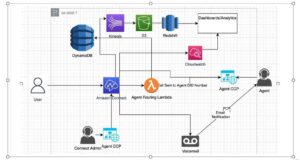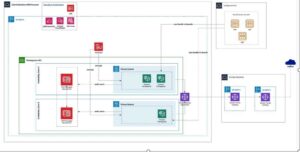About Client
Revenue Cycle SAAS Company
The customer is a SaaS startup firm that provides integrations between healthcare provider registration, patient care, and insurance claim systems and connects them to their workforces. The company also offers a data analytics and insights solution that accelerates revenue cycles.
Internal Development Focus Requires Help to Build Supporting Infrastructure
After a startup builds and tests a software prototype to prove it delivers on the value proposition the company plans to offer, the next step is to deploy the required IT infrastructure to bring the solution to market. Creating a viable product that works in the lab is one thing. Deploying it so the software provides superior user experiences and maintains resiliency during spikes in workload demand is another major hurdle to clear.
That’s the challenge a US startup faced as company executives planned to launch an innovative service to enable hospitals to accelerate revenue cycles by leveraging an automated analytics engine. As part of this service, the company also planned to offer onsite personnel to assist with insurance claims as well as integrate the processing with patient registration systems. This combination of services adds up to more accurate and expedient billing that allows hospitals to collect payments sooner from insurance companies and patients.
With internal technical resources focused on developing the front-end software, the startup needed additional help to build the IT infrastructure to support the solution. Under pressure from investors to go to go to market and generate profits as soon as possible, hiring full-time resources was not an option. The cost would be too high, and the timeline to go into production would take too long.
Company executives had already determined the Amazon Web Services (AWS) cloud platform was the ideal environment for the IT infrastructure to support the solution. But they also needed a cloud partner with the required expertise to design and deploy an optimal architecture.
Avahi: An AWS Partner with Cloud, Data, and Software Engineering Expertise
AWS knew just the partner to solve these challenges: Avahi Technologies. Avahi—an AWS partner with a team of cloud, data, and software engineering experts—specializes in assisting startup companies with bringing applications to market.
Avahi began the project by helping the company leverage the AWS Jumpstart program, which supports startups with a vision for an offering that requires specific AWS services but have limited cloud knowledge and internal technical resources. The program also offers funding incentives.
Given the strong recommendation from AWS, the startup immediately trusted Avahi could provide the required expertise to design an AWS infrastructure to support the revenue acceleration solution. The project plan Avahi presented also convinced company executives that a partnership with Avahi would ensure the solution could go to market in less than six months.
Another key attribute the Avahi team demonstrated was its ability to collaborate effectively with other teams. This included the startup’s internal development team as well as other technology partners with applications that needed to connect with the AWS environment, such as identity and access management services as well as compliance rules.
A Repeatable Application Infrastructure to Accelerate Customer Deployments
Avahi first conducted analysis to understand the startup’s requirements for building an environment to support the automated analytics engine as well as the onsite personnel who assist with claims processing and the integration with hospital patient registration systems. Avahi then recommended configuring three AWS services to deliver the required functionality:
- AWS WorkSpaces—a managed desktop-as-a-service solution with multi-factor authentication that allows onsite personnel as well as hospital clinicians and administrators to securely interact with the claims processing application, the data analytics engine, and all other business applications used by the startup.
- Amazon HealthLake—a scalable HIPAA-eligible data lake that ingests individual patient and patient population data from electronic health record systems and then analyzes insurance claims so hospitals can prioritize which claims require mediation.
- Amazon Connect—a customer service contact center platform that routes patients to the appropriate service agent and enables them to register patients and set up appointments. Agents have the flexibility to log in to virtual desktops so they can work at hospital sites or from home offices.
For the architecture to support WorkSpaces, HealthLake and Connect, Avahi recommended leveraging the Infrastructure as Code (IaC) approach. IaC generates the same environment every time to automate the deployment process for new customers. The startup can also streamline the management of the network topology, virtual machines, and load balancers.
To keep the project moving forward and on time, Avahi participated in two scrum calls every week throughout the project. Along with the customer team and the other partners, Avahi reported on progress and discussed any issues that needed to be addressed. This approach enabled the combined teams to remove any roadblocks impacting the completion of the project.

Solution Primed for General Availability
After designing and building the application infrastructure, Avahi provided a proof-of-concept of the solution that ran for several months. Avahi also orchestrated the provisioning of all services and compute resources so they synchronously go live when requested by hospitals. The Connect infrastructure deploys within 10 minutes while the HealthLake infrastructure is ready in less than 20 minutes.
Another key facet is the continuous integration and deployment process, which ensures the system performs according to the service level agreements the startup plans to offer to hospitals. Avahi also worked closely with the AWS support team for resellers to configure WorkSpaces for availability and resource quotas while tuning Connect for audio optimization. The company now has an out-of-the-box solution it can quickly roll out each time it onboards a new hospital customer. Within the WorkSpaces account, users can access the Connect and HealthLake services as well as the custom applications developed by the startup along with email, ERP, CRM, and chat.
A month after going live with the Avahi solution, the company acquired its first beta customer. The business plan calls for recruiting additional beta customers and then announcing the general availability of the solution within six months. The AWS environment designed by Avahi is also set up to automatically scale as the customer base grows. This will allow the startup to optimize compute-resource costs so they sync with revenue generation.
The startup can also store all client data in a master account for high-level analysis of the volume of data that’s processed as well as the number of claims handled by customers. The startup also has visibility into the number of customers, pipelines, and patient calls. With all this information, management can calculate the percentage of overall AWS costs to allocate to each customer account.
Even more important, the startup is ready to deliver on its value proposition. Based on treatment plans and insurance coverage, hospitals that use the solution can quickly assess each patient’s ability to pay for health services. A dashboard provides ratings on the likelihood each patient will pay their bill or default. Hospitals can also manage payments over time and score their overall accounts payables to project future cash flow.
A Single Partner to Handle All AWS Needs
The core AWS services involved in this project—WorkSpaces, HealthLake and Connect—all require unique technical expertise and in-depth knowledge of HIPAA and SOC2 compliance to incorporate into the overall solution the startup plans to offer to customers.
The project also involved a wide range of other AWS services and third- party tools. By collaborating with the Avahi team and its broad range of technology skills, the company was able to work with just one partner rather than coordinating the activities of multiple partners to cover the entire scope of the project.
Key Challenges
- Build AWS application infrastructure to launch a new company and its healthcare service.
- Eliminate cost and delay of using internal resources to build the infrastructure.
- Identify a partner with the required cloud infrastructure, data, and security expertise.
Key Results
- Deployed AWS infrastructure on time—in less than five months.
- Provided engine to drive application for accelerating hospital revenue cycles.
- Created integrations for user desktops with analysis engine, call center, and electronic health records.
- Enabled startup to onboard first beta customer.
- Configured infrastructure to automatically scale as customer base grows.
Third-Party Tools & Integrations
- Infrastructure as Code
- GitHub
- Okta
- Alert Logic
- Active Directory
- SQL Workbench/J
- SnapLogic
AWS Services
- AWS WorkSpaces
- Amazon Connect
- Amazon HealthLake
- Amazon Simple Storage Service (S3)
- Amazon Elastic Compute Cloud (EC2)
- Amazon Redshift
- AWS Lake Formation
- AWS Identity and Access Management (IAM)
- Amazon Virtual Private Cloud
- AWS Lambda
- AWS Control Tower
- AWS Config
- Amazon API Gateway
- AWS Amplify
- Amazon Cognito
- Amazon QuickSight
- Amazon EventBridge
- AWS Systems Manager
- AWS Glue
- Amazon Athena
- Amazon Kinesis
- Amazon DynamoDB
- Amazon Transcribe
Solution Architecture Diagrams







